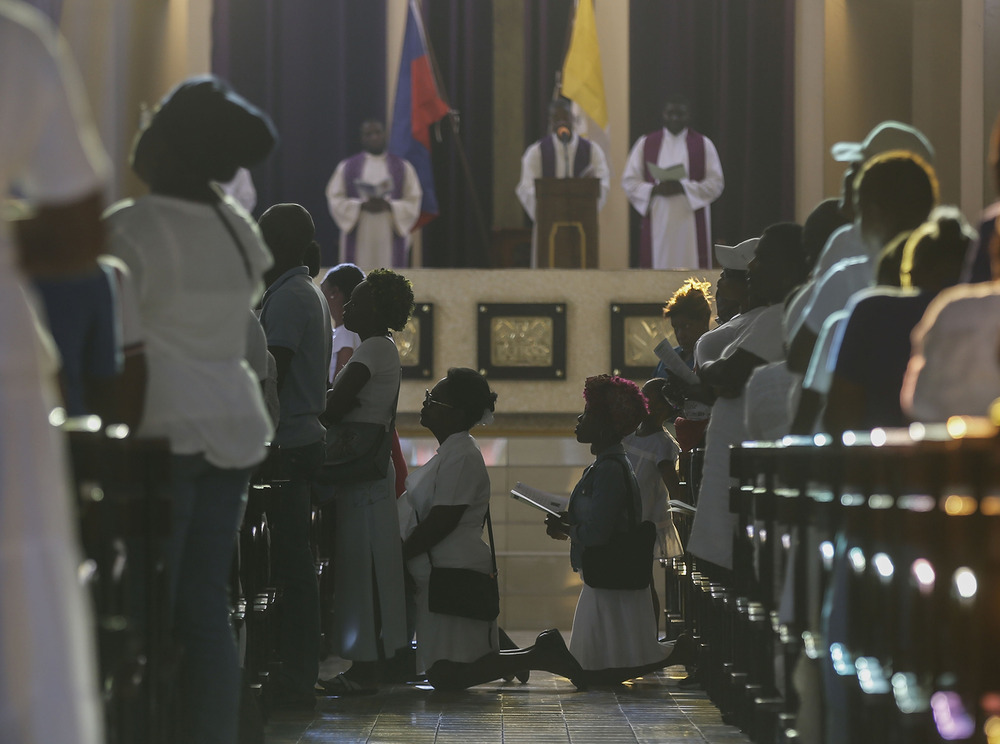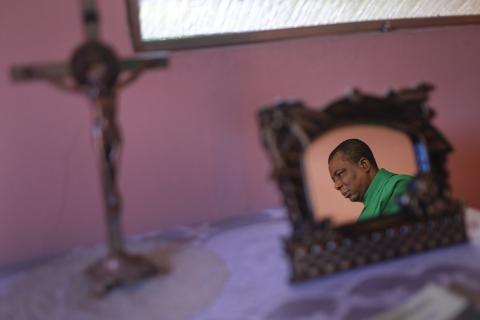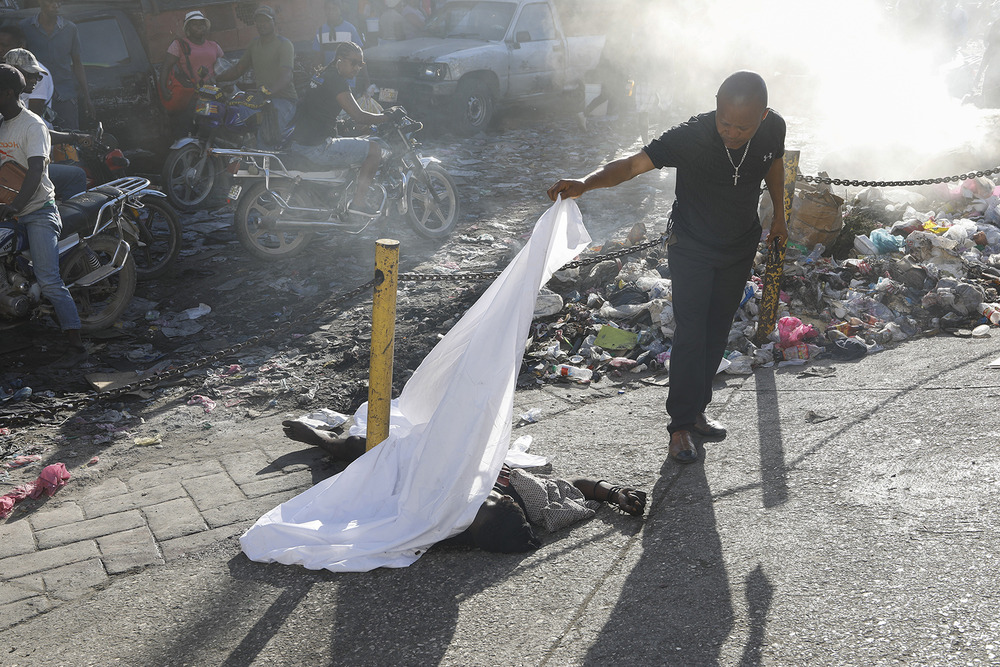
Faithful kneel in prayer during a Good Friday service as part of Holy Week celebrations at the Saint Pierre Catholic Church in the Pétion-Ville neighborhood of Port-au-Prince, Haiti, Friday, March 29, 2024. (AP/Odelyn Joseph)
As criminal organizations extend their control over Haiti, kidnappings have continued to terrorize the country’s residents, with Catholic priests and other missionaries becoming some of the most common targets. In 2024 alone, at least 14 priests and religious brothers and sisters are being held.
Over the past three years, since President Jovenel Moïse was assassinated and criminal gangs began to take over the capital city, Port-au-Prince, kidnappers have focused on the country’s few higher-income professionals and those they believe will be able to secure large ransoms. In impoverished Haiti, that includes clergy and religious.
A nun who was abducted along with two other sisters in early March told Religion News Service that the gang requested a ransom of $2 million. “It was completely impossible to raise that kind of money,” said the nun, who asked to remain anonymous for safety reasons.
The bandits ended up freeing the nuns after one day without receiving any money, coming away only with two cars they had stolen to transport their victims.
“The ransom requested by kidnappers is usually too high,” said the Rev. Gilbert Peltrop, secretary general of the Conference of Religious of Haiti. “They ask for hundreds of thousands, at times millions, of dollars.”
Advertisement
Peltrop has been negotiating with kidnappers on behalf of Catholic priests, nuns and brothers for the past three years, becoming something of an accidental expert in how to hold out until a less incongruous amount is agreed upon between the criminals and the church.
The trauma of being held captive is no less, those who have been abducted say, because they are serving as missionaries. “We cannot talk about ‘good treatment’ in the hands of the kidnappers. Some victims are bitten up. Others are kept without food and water for up to two days. They commonly have to remain several days without taking a shower,” Peltrop said.

FILE – Reflected in a mirror, Catholic priest Jean Nicaisse Milien changes clothes to start giving a Mass in Port-au-Prince, Haiti, Sunday, Nov. 7, 2021. Father Milien was kidnapped for 20 days along with other priests, nuns, and civilians in April by the 400 Mawozo gang. (AP/Matias Delacroix, File)
The Rev. Jean Nicaisse Milien was taken in 2021 by more than a dozen armed men on his way to a fellow minister’s installation in a nearby parish. “I was taken by armed men along with nine other people. There were five priests, two nuns and three lay Catholics,” he said.
He and his fellow victims were kept in a small house where they slept on the ground and were given only small portions of rice and bread to eat. In the days before his release three weeks later, Milien got almost nothing to eat or drink.
The kidnappers, part of the major Haitian gang the 400 Mawozo, confiscated their captives’ cellphones and got in touch with their families, demanding a ransom of $1 million per person.
The sister who was abducted last month said she was working at her congregation’s school when the criminals climbed up the wall and took control of the place.
“Three of us were taken, while two others were spared so they could take care of the children,” she said. “They gave us just one meal, and we had to split one liter of water among the three of us during almost two days,” she said.
They were released by about 6 p.m. on the next day. She’s still trying to recover from the experience. Though they didn’t suffer physical violence, “the emotional shock was there,” she explained.
Peltrop said that most criminals think that the clergy are rich because many Catholic schools are upscale institutions that own houses and cars. “They don’t know that large institutions have high costs,” he said, or that their apparent wealth comes from donations from international Catholic charities, like Adveniat, he added.

A person lifts a sheet to look at the identity of a body lying on the ground after an overnight shooting in the Petion Ville neighborhood of Port-au-Prince, Haiti, Monday, March 18, 2024. (AP/Odelyn Joseph)
Hérold Toussaint, a psychologist, theologian and sociologist at the State University of Haiti, says kidnappers may also abduct church missionaries for other reasons besides the financial ones, pointing to the Catholic Church’s long relationship with the Haitian state: the government signed a concordat with the Vatican in 1860.
During the Duvalier family dictatorship, which ruled Haiti from the 1950s to the 1980s, the church has mostly kept silent in the face of the crimes perpetrated by the state. Despite changes in Haitian Catholicism over the past few decades that brought the church closer to the poor, many Haitians still see it as part of the power structure in the country, Toussaint explained.
In his opinion, the church should adopt a more “prophetic” tone, refusing to play a role in mediating the crisis and taking more concrete steps to help the neediest in society.
The Rev. Jean Nicaisse Milien, a priest in the Diocese of Campinas, in Brazil, said Haiti’s Latin American neighbors should do more for the country. He emphasized that the security crisis combines with other factors, such as Haiti’s extreme poverty, deep unemployment, lack of infrastructure and natural catastrophes, to feed the immigration crisis that is affecting the entire region as well as its northern neighbors.
Haitians are among the most significant groups currently crossing the Darien Gap, a highly dangerous rainforest zone between Colombia and Panama, to reach the U.S.-Mexico border.
“Other Latin American countries have their own needs and limitations, but they could help Haiti in the struggle against its multiple crises,” Milien said.
He thinks that economic and technical cooperation, including an exchange of scientists and students, would reduce criminality in the long run.





